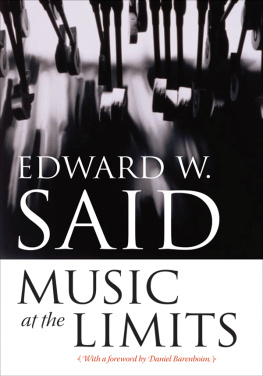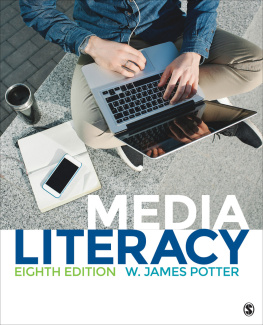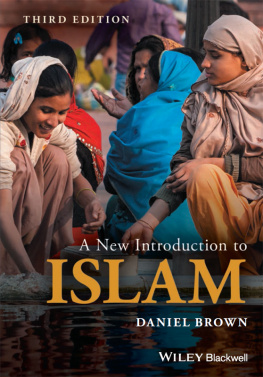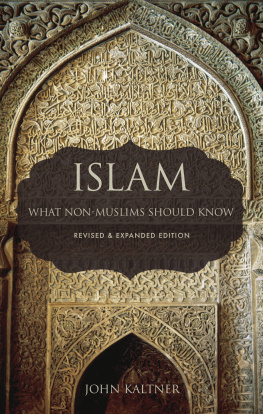COVERING ISLAM
Edward W. Said is the University Professor of English and Comparative Literature at Columbia University, where he also chairs the doctoral programme. He is a prolific writer on a wide range of topics including literature, music, cultural criticism and Middle Eastern issues. He is the author of Beginnings: Intention and Method; Orientalism; The Question of Palestine; The World, the Text and the Critic; After the Last Sky: Palestinian Lives; Musical Elaborations; Culture and Imperialism; The Politics of Dispossession and Peace and its Discontents. He gave the Reith Lectures, Representations of the Intellectual, in 1993.
BY EDWARD W. SAID
Joseph Conrad
and the Fiction of Autobiography
Beginnings: Intention and Method
Orientalism
The Question of Palestine
Literature and Society
Covering Islam
The World, the Text and the Critic
After the Last Sky
Blaming the Victims: Spurious Scholarship
and the Palestinian Question
Musical Elaborations
Culture and Imperialism
Representations of the Intellectual:
The 1993 Keith Lectures
The Politics of Dispossession:
The Struggle for Palestinian Self-Determination
19691994
Peace and Its Discontents:
Gaza Jericho 19931995
INTRODUCTION
TO THE VINTAGE EDITION
In the fifteen years since Covering Islam appeared there has been an intense focus on Muslims and Islam in the American and Western most of it characterized by a more highly exaggerated stereotyping and belligerent hostility than what I had previously described in my book. Indeed, Islam's role in hijackings and terrorism, descriptions of the way in which overtly Muslim countries like Iran threaten "us" and our way of life, and speculations about the latest conspiracy to blow up buildings, sabotage commercial airliners, and poison water supplies seem to play increasingly on Western consciousness. A corps of "experts" on the Islamic world has grown to prominence, and during a crisis they are brought out to pontificate on formulaic ideas about Islam on news programs or talk shows. There also seems to have been a strange revival of canonical, though previously discredited, Orientalist ideas about Muslim, generally non-white, peopleideas which have achieveda startling prominence at a time when racial or religious misrepresentations of every other cultural group are no longer circulated with such impunity. Malicious generalizations about Islam have become the last acceptable form of denigration of foreign culture in the West; what is said about the Muslim mind, or character, or religion, or culture as a whole cannot now be said in mainstream discussion about Africans, Jews, other Orientals, or Asians.
Of course there have been many provocations and troubling incidents by Muslims and such Islamic countries as Iran, Sudan, Iraq, Somalia, Afghanistan, and Libya during the past decade and a half. Consider the following abbreviated list of offenses. During 1983 in Lebanon about 240 United States Marines were killed by a bomb that was taken credit for by a Muslim group, and the United States embassy in Beirut was blown up by Muslim suicide bombers with considerable loss of life. In the 1980s numerous American hostages were taken by Shi'a groups in Lebanon and held for long periods of time. A number of plane hijackingsof which the most notorious was the TWA flight that was held in Beirutbetween the 14th and 30th of June, 1985were claimed by Muslim groups, as were several bomb atrocities in France at roughly the same time. The 1988 explosion of Pan Am flight 109 over Lockerbie, Scotland, was carried out by Islamic terrorists. Iran achieved a new prominence as the purported backer of and sympathizer with various insurgent groups in Lebanon, Jordan, Sudan, Palestine, Egypt, Saudi Arabia, and elsewhere. Afghanistan, following the end of the Soviet occupation, seemed to have descended into a cauldron of feuding Islamic parties and tribes; many of the Muslim insurgentsparticularly the Talibanarmed, trained, and bankrolled by the United States have now overrun the country. Some of those earlier American-trained guerrillas have turned up elsewherelike Sheikh Omar Abdel Rahman, who was convicted of masterminding the 1993 bombing of the World Trade Centerand now seem to be fomenting civil strife in Egypt and Saudi Arabia, important United States allies in the Middle East. Khomeini's fatwa against Salman Rushdie (February14,1989) and the multimillion dollar reward for the writer's assassination that accompanied it seemed to epitomize Islam's viciousness, its resolute war against modernity and liberal values, as well, of course, as its capacity of reaching across the oceans into the heart of the West in order to challenge, provoke, and threaten.
After 1983, Muslims declaring their faith in Islam were everywhere in the news. In Algeria they won municipal elections and were prevented from acceding to power by a military insurrection. Algeria is still in the throes of a truly appalling civil war, in which militants battle army groups, and thousands of intellectuals, journalists, artists, and writers have been killed. Sudan is now ruled by a militant Islamic party whose head, Hassan al-Turabi, is often represented as a brilliantly malevolent individual, a Svengali and Savonarola clothed in Islamic robes. Dozens of innocent European and Israeli tourists have been murdered by Islamic assailants in Egypt, where the power of the Muslim Brotherhood and the Jama'at Islamiya one more violent and uncompromising than the otherseems to have grown enormously over the past decade. Once supported by Israel as a way of undercutting the PLO's authority during the Palestinian intifada (which began in December 1987) on the occupied West Bank and Gaza Strip, Hamas and with it Islamic Jihad have metamorphosed into the most feared and journalistically covered examples of Islamic extremism, with many suicide bombs, exploded civilian buses, and murdered Israeli civilians comprising their list of heinous acts. No less fearsome are the guerrillascommonly referred to in the American media as terroristsof Hizbol-lah (the Party of God), who identify themselves and are perceived locally as resistance fighters resisting the illegal Israeli occupation of a substantial so-called security strip in South Lebanon.
In March 1996, a major international conference attended by numerous heads of state, including President Bill Clinton, Prime Minister Shimon Peres, President Hosni Mubarak, and Chairman Yasir Arafat, was convened in the Egyptian port city of Sharm el-Sheikh to discuss "terrorism," a recent example of which had been three suicide attacks on Israeli civilians. In his speech, broadcast the world over, Peres left no doubt in the public's mindsas did the conference itselfthat it was Islam and Iran's Islamic Republic which were to blame. So inflamed against Islam has the media environment in the United States and the West generally become that when the Oklahoma City bomb attack took place in April 1995 the alarm was sounded that the Muslims had struck once again; I recall (with residual chagrin) that I must have received twenty-five phone calls that afternoon from newspapers, the major networks, and several resourceful reporters, all of them acting on the assumption that since I was from and had written about the Middle East that I must know something more than most other people. The entirely factitious connection between Arabs, Muslims, and terrorism was never more forcefully made evident to me; the sense of guilty involvement which, despite myself, I was made to feel struck me as precisely the feeling I was meant to have. The media had assaulted me, in short, and Islamor rather my connection with Islamwas the cause.








